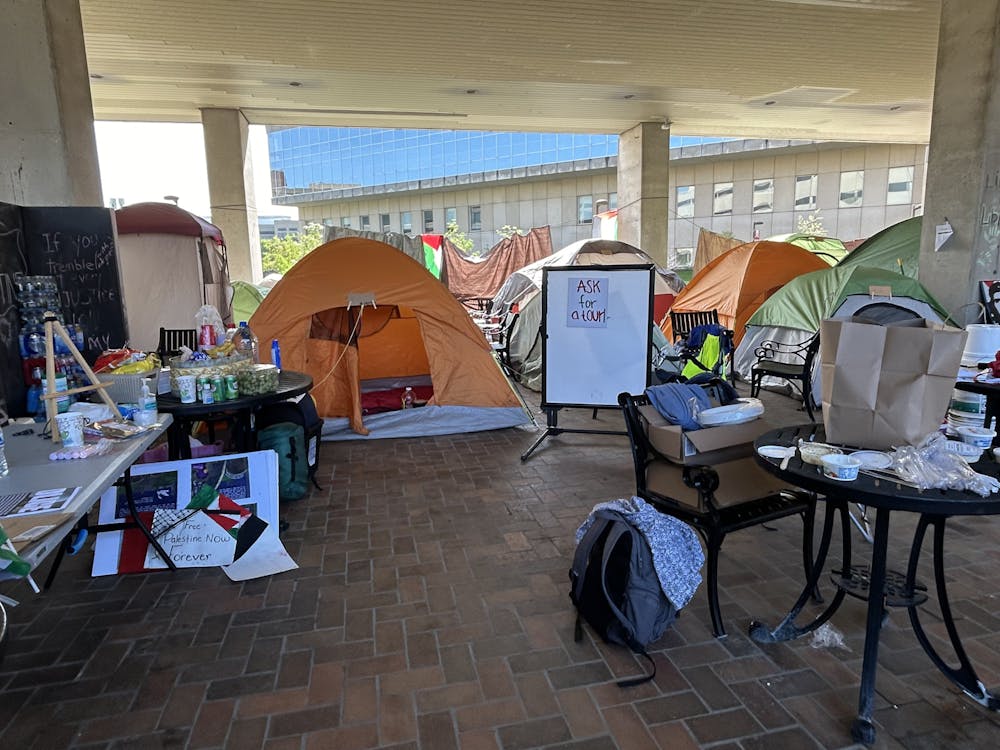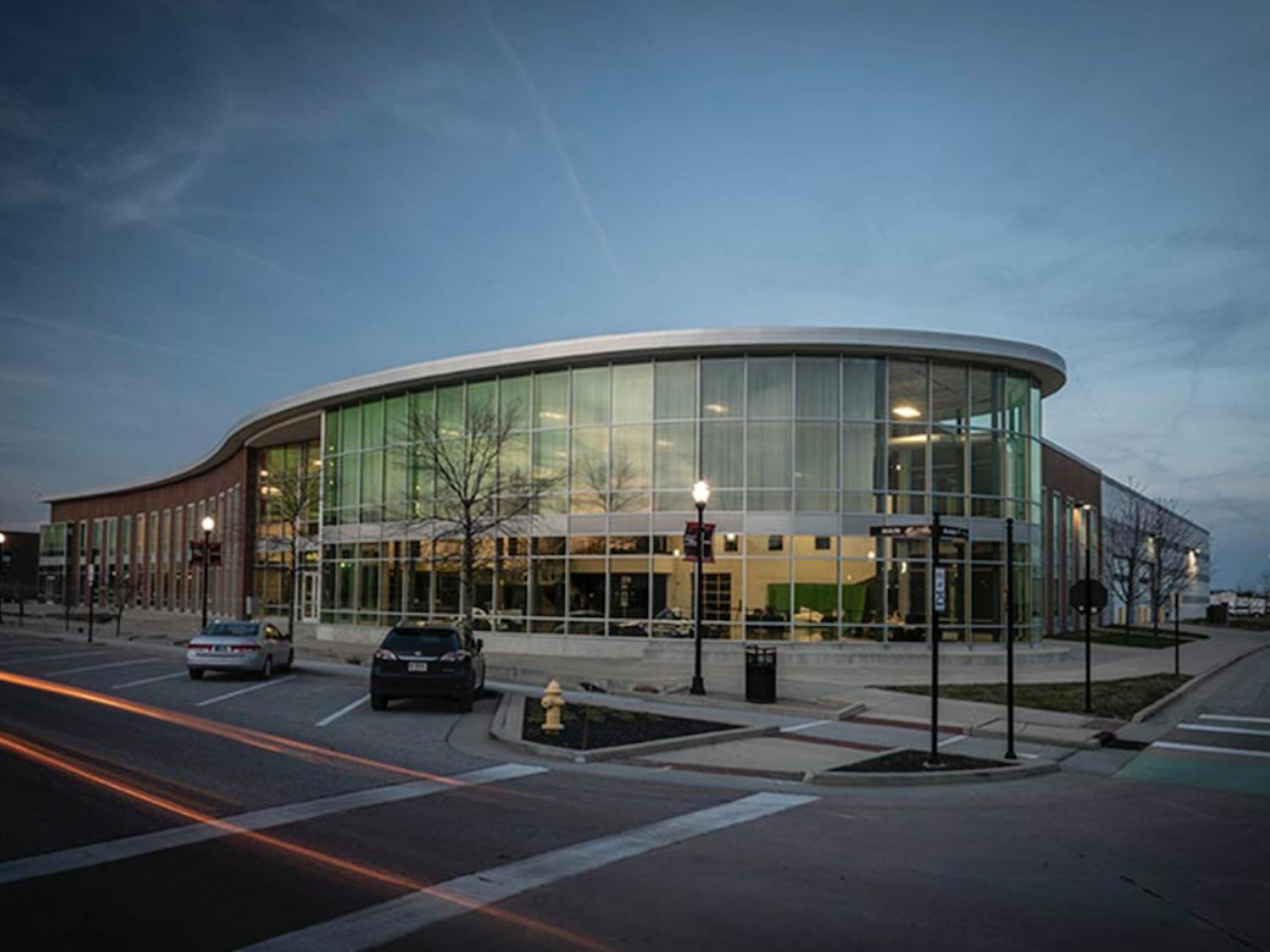In the last several weeks, students at universities across the U.S. have been setting up pro-Palestinian divestment encampments, and IUPUI is no exception. On April 26, IUPUI students set up their divestment encampment in Democracy Plaza below the Kelley School of Business building by Taylor Hall following the establishment of an encampment on IU Bloomington campus.
In response to the encampment being raised on IU Bloomington campus, President Pamela Whitten and Provost Rahul Shrivastav issued a press release about their stance on the protests.
“First, our campus–like so many others–has experienced the escalation of a national movement on numerous college campuses to erect encampments and occupy universities indefinitely. Such un-regulated encampments raise concerns for us as stewards of the campus because they tax limited public safety resources and become magnets for those making threats of violence or who may not have the best interest of Indiana University in mind,” the press release said.
The press release also addressed public outrage surrounding the arrest of more than 50 protestors and recent police actions including snipers spotted on top of IU buildings.
“After standing down for 24 hours, we sought to give the protestors the opportunity to comply with policy, particularly the 1969 prohibition of tents after 11 p.m. They chose to expand the encampment after 11 p.m.,” the press release said. “Therefore, on Saturday we again made the decision to enforce university policy and remove tents and other temporary structures. The Indiana State Police provided the additional manpower needed to address heightened levels of potential threats.”
According to Devyn Naylor, a community organizer with the Central Indiana Democratic Socialists of America (DSA), seeing the treatment of IU Bloomington students was the last straw leading to the formation of the IUPUI encampment.
“Thursday night, after seeing how IU Bloomington responded to the protesters there. We were talking about doing things, but the final straw was just the outright abuse and squashing of free speech not just by the campus, but by state police as well,” Naylor said. “We decided we had to get this time to show that this is a satellite campus, and we stand in solidarity, not with just them, but also what's going on in Gaza and Palestine. [We] just [want] to make our voices heard because obviously, the politicians aren't just going to do the right things by themselves.”
Layth Abdulbari, a student and community organizer, speaks on his own experience as a community organizer.
“The fact that I get to say, as a student, that IUPUI, and all of their satellite campuses, are not only condoning the murder of my family, but supporting this. I think for me, that was the limit. I sadly have the opportunity to say that IUPUI is killing my family. I think I've been able to help organize as much as possible around the fact that so many students have lost families to this world,” Abdulbari said. “We don't want genocides, we don't want to apartheid. We want to invest in our students here. We want to make sure that our families, and Palestine, are safe and protected from American imperialism, Israeli genocide and execution extermination.”
For Naylor, they are supporting not only Palestine and those in Gaza, but also other IUPUI students.
“They [IU] don't care about you, and that is why we are here- to make a voice and make a statement because we care about us. We think that money would be better served for the students with better accommodation, better everything, better teachings, you know,” Naylor said. “That's the main thing is that this is being done in solidarity with the students, for the students. Your money is directly funding genocide, and I don't think anyone who went to IUPUI signed a statement saying, ‘Hey, I want to my money to go to genocide.’”

The encampment is also an opportunity to teach others about what is happening right now in Palestine and the Palestinian experience.
“I've actually had the opportunity to practice this specific topic, probably 200 times this week. But my whole life, as Palestinians, we are made to essentially beg for any form of recognition or any form of assistance. And we're tired of it, but it's just the way things are. And I think that's also a testament to how the system treats Palestinians, we’re barely seen as human,” Abdulbari said. “But to answer your question, I would say, you know, we're human beings. And we have a right to resistance when it comes to occupation, when it comes to apartheid, when it comes to genocide, and that is one of the things that we're trying to garner support for.”
IUPUI’s Palestinian Solidarity Committee (PSC) has been working with other community organizations and universities in order to make the encampment a success.
“We are in solidarity with the other encampments, and we are in contact with them. We would love for more students to get out here and support us. We're working closely with IUB graduate workers and Purdue and Notre Dame now because they're trying to do an encampment as well. And a few other universities are working with us,” Abdulbari said. “We're in communication across the country, and this is probably one of the largest solidarity movements. We've seen the success in apartheid South Africa in the Vietnam War. We've seen this work.”
PSC has made posts on their social media with their demands for IU including: the resignation of Whitten, Shrivastav and Vice Provost of Faculty and Academic Affairs Carrie Docherty, the end of the Crane partnership, divestment from Israel, adherence to BDS guidelines, a Muslim and middle eastern cultural center, reinstatement of artist Samia Halaby and Professor Abdulkader Sino and all disciplinary actions for protestors to be dropped.
For those interested in showing their support, but are unsure how to start, Naylor offers a few solutions.
“Come join us, even if it's just a five-minute conversation, to just come out, and learn and listen to Palestinian voices in your community, like Layth, for example, and his family, and others to educate and make your voices heard. You don't have to do anything radical; you can just come join the solidarity they can just learn what everything's about and learn more ways to support,” Naylor said.
Abigail Godsen (she/her) is a sophomore majoring in Applied Information Sciences with a minor in Classics. She is a reporter, podcast co-host and Lead Copy Editor for The Campus Citizen. When she isn’t writing, Abby likes to cook, do crossword puzzles and drink a lot of tea. She can be summoned using tea, cardigans and books (according to her roommate Jackie).





